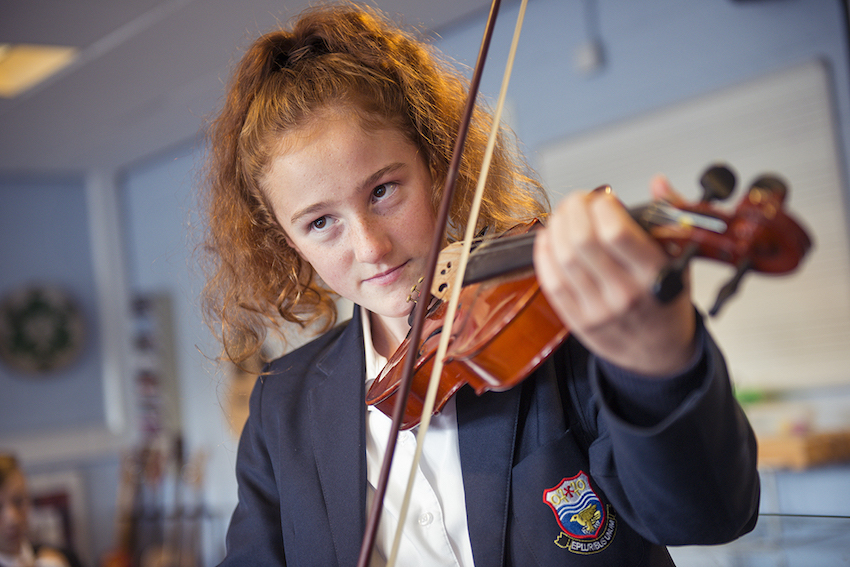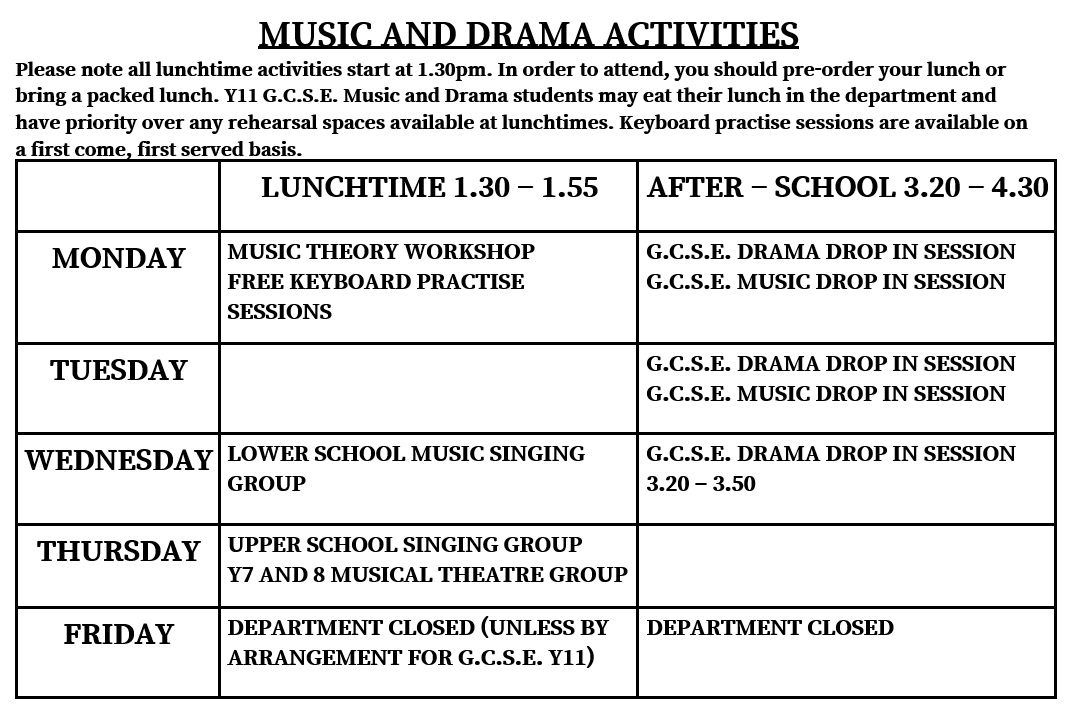Music

Music
Department Aims
The department is committed to offering a wide range of musical opportunities for all students to create and flourish, both in the curriculum and as extra-curricular opportunities, regardless of their ability and experience. There is an emphasis on delivering the subject through a practical approach and the department aims to ensure that lessons are enjoyable, informative and challenging.
All students are encouraged to aim high at all times and last year’s G.C.S.E. examination results reflect this drive for achievement. 100% of the students achieved A* – B grades. 64% achieved A*/A grades.
Course content Key Stage 3
At Key Stage 3, all students receive a one hour weekly Music lesson. Students study a range of different musical styles and cultures. The curriculum focuses on the three main skills of Performing, Composing and Listening and Appraising Pupils use electronic keyboards, percussion instruments, pop instruments and ipads in their lessons. They also sing regularly in all years.
The curriculum is designed to cater for a wide range of musical interests and abilities. Topics include:
Year 7
- Baseline assessments
- Developing the Voice
- Samba
- Keyboard Skills
- Pentatonic Scale
Year 8
- Improvisation
- Investigating Chords
- Song Writing
- Extending keyboard skills
- Blues music
Year 9
- Band Skills (two projects)
- Film music
Course content Key Stage 4
Key Stage 3
Music is a popular option subject. Year 11 students follow the AQA course and Year 10 students follow the Eduqas course. They receive two one-hour sessions each week. All students following Music to G.C.S.E. level are expected to be regularly be receiving Music lessons on an instrument or voice and developing their practical skills outside the classroom. There is an emphasis on the following three areas:
- Listening
- Performing
- Composing
How we Stretch and Challenge our students in Music
Key Stage 3
Students follow a programme of study each academic year, which includes performing, composing and listening tasks. We encourage all students to maximise their musical potential in all of these areas, both inside and outside of the classroom.
Recently we have introduced Showbie, a paperless classroom system in to the Music department. Showbie is an app used to assign, collect and review student’s work. All of the resources for lessons can be accessed from home as well as in school. At a glance, students can see their upcoming assignments and due dates so they can prioritise their work. Students can record their performances both in school and at home and put them in their Showbie account. Challenge materials are regularly posted in Showbie for students to use. Regular, individual feedback is a feature of the system we have put in place.
Key Stage 4
Students are assessed regularly on performing, composing, and listening tasks. All students following G.C.S.E. Music courses utilise Showbie.
Performance assessments are recorded every term and are uploaded in to Showbie. Listening assessments are completed weekly, both in class and at home and there are regular summative assessments to track progress in the learning process. Composing tasks are completed regularly and every term, at least two are uploaded in to Showbie. Teacher comments and student responses are given on Showbie detailing the learning journey.
How we support our students
Students at Key Stage 3 and 4, following Music courses, utilise and have access to Showbie. The resources used in lessons are posted on Showbie as well as a wide range of challenge materials to support and extend learning. Regular feedback and guidance is given in lessons and, also via Showbie. They can ask questions about their learning and receive personalised advice. Students can post any performance (made in or out of school) and a member of staff will comment and offer individual advice and support.
Recognising the need for regular practise to improve a student’s musical ability, the department has an ‘open’ policy and students can utilise the facilities at break, lunchtime and after school. There are regular concerts and trips to promote and inspire musical performance.
How we deliver Numeracy in Music
Numeracy is an inherent focus of many of our Music lessons, as students are encouraged to work with rhythm and rhythmic notation. Note durations and rhythms are directly related to the concepts of fractions and ratio. The understanding of pulse, beat and time signatures all require an element of knowledge of numeracy. Students have termly notation tests where they are required to understand and write written notation
How we deliver Literacy in Music
High standards of literacy are expected and encouraged in the Music department in all lessons. At all key stages, students learn to apply subject specific vocabulary through discussion, reflection and written evaluation. To reinforce understanding, technical language displays, under the heading of musical elements, are displayed in the classroom. There are regular spelling tests based on key music words and students write lesson reviews and describe music.
Examinations
KS3 – there are no formal examinations, but there are regular test assessing the understanding of musical terms and knowledge of music notation
KS4 – Performance and Composition portfolios are marked in school and samples sent to the examination board. An Appraising and Listening examination is sat during the normal final examination period.
Staff List
Mrs V Nelson (Subject Leader for Music)
Simon Webster (Guitar, ukulele and G.C.S.E. Music Technology)
Adam Christopher (Piano and keyboard)
Graham Lister (Drums)
Kath Henderson (Vocals)
Georgia Barry (Vocals)
Victoria Routledge (Violin
Bethan Thompson (Cello)
Extra-curricular Activities
Each term a varied programme of extra-curricular activities is offered to students, including Singing Groups, Band Workshops, Theory Club, Music Technology and Composition Workshops.
There are numerous performance opportunities during the school year and all students are encouraged to participate and to showcase their musical talents. Performance opportunities include assemblies, the Christmas Concert, Music Week, Talent Shows, Presentation Evening, and Intake days. Each term a varied programme of extra-curricular activities is offered to students, including Singing Groups, Band Workshops, Theory Club, Music Technology and Composition Workshops.
Instrumental/Vocal Tuition
We have a team of experienced, high quality visiting music teachers working in the department offering tuition on the piano, keyboard, guitar, ukulele, saxophone, violin, drums and voice. Lessons take place during the school day and are rotated to avoid missing other subjects. Students are encouraged to take performance and theory examinations, which can generate UCAS points as well as providing valuable experience for students hoping to audition for places in further education. Parents pay the cost of these lessons and further details are available from the Music department.

How parents can support their children
- Encourage children to take music lessons and learn a musical instrument or/and how to sing
- Encourage children to listen to a wide range of music – You Tube is a valuable resource
- Encourage to engage in a musical activity inside or outside of school
- Encourage children to attend concerts and to enjoy live music
- Talk about music in the home – ask them to describe the style using musical vocabulary
- Ask them to show you their Showbie accounts so that you can engage in their learning
.png)